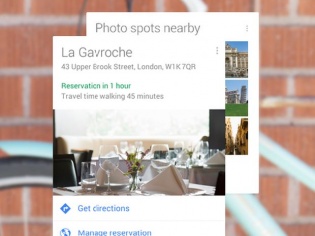-
Sheldon Pinto
19:19 19th Sep, 2014
Google “Active Watching” Patent Is Cool, But Soon Gets Creepy | TechTree.com
Google “Active Watching” Patent Is Cool, But Soon Gets Creepy
While everything starts off pretty well with Google listening to your voice, it gets creepy when you know it's watching you as well.

Google has indeed been working on Google Now actively and we can see that the updates that show up once in a few months. While the feature is pretty cool and comes on every Android smartphone that runs Android 4.1 Jelly Bean and over, there is indeed a border line where in few people realise that Google is indeed monitoring a lot of things that you do, where you go and what you are searching for. Of course the company will take away your privacy and give you something in return while keeping your data safe and sound. Still then, at times it does get creepy when Google Now begins to predict things a bit too accurately. Well things may get creepier with the new patent that Google recently filed.
The patent titled as ‘detecting the end of a user question’ simply focusses on training your smartphone when to listen to a search query. More importantly when the query ends and when it needs to stop listening. More over it also shows how humanised the questions can be compared to the verbatim commands that we use with Google Now today (think Cortana). It is indeed a bit cool as you will no longer need to say “Ok Google” as the smartphone will always be listening.

So how does this work? Well, here is where the creepy part begins. The smartphone (computer in the diagram) as the patent puts it will “determine the number of people in an area represented by the visual data, the identity of the people, the vertical and horizontal angles of the heads of the people, and lip movement of the people”. This it obviously does with help from the camera on your smartphone. By using the smartphones various microphones it kind of figures out who is sitting where and who’s voice it should prioritise for the search query.
Well things get worse after that as the patent also mentions that it stores data related to user’s “social networks, social actions or activities, profession, user preferences”. Indeed this is still a patent so someone somewhere in Google is working on it right now. Clearly we should not be surprised, as users today willingly submit personal data in exchange for convenience. It’s always about give and take right?
- DRIFE Begins Operations in Namma Bengaluru
- Sevenaire launches ‘NEPTUNE’ – 24W Portable Speaker with RGB LED Lights
- Inbase launches ‘Urban Q1 Pro’ TWS Earbuds with Smart Touch control in India
- Airtel announces Rs 6000 cashback on purchase of smartphones from leading brands
- 78% of Indians are saving to spend during the festive season and 72% will splurge on gadgets & electronics
- 5 Tips For Buying A TV This Festive Season
- Facebook launches its largest creator education program in India
- 5 educational tech toys for young and aspiring engineers
- Mid-range smartphones emerge as customer favourites this festive season, reveals Amazon survey
- COLORFUL Launches Onebot M24A1 AIO PC for Professionals







TECHTREE